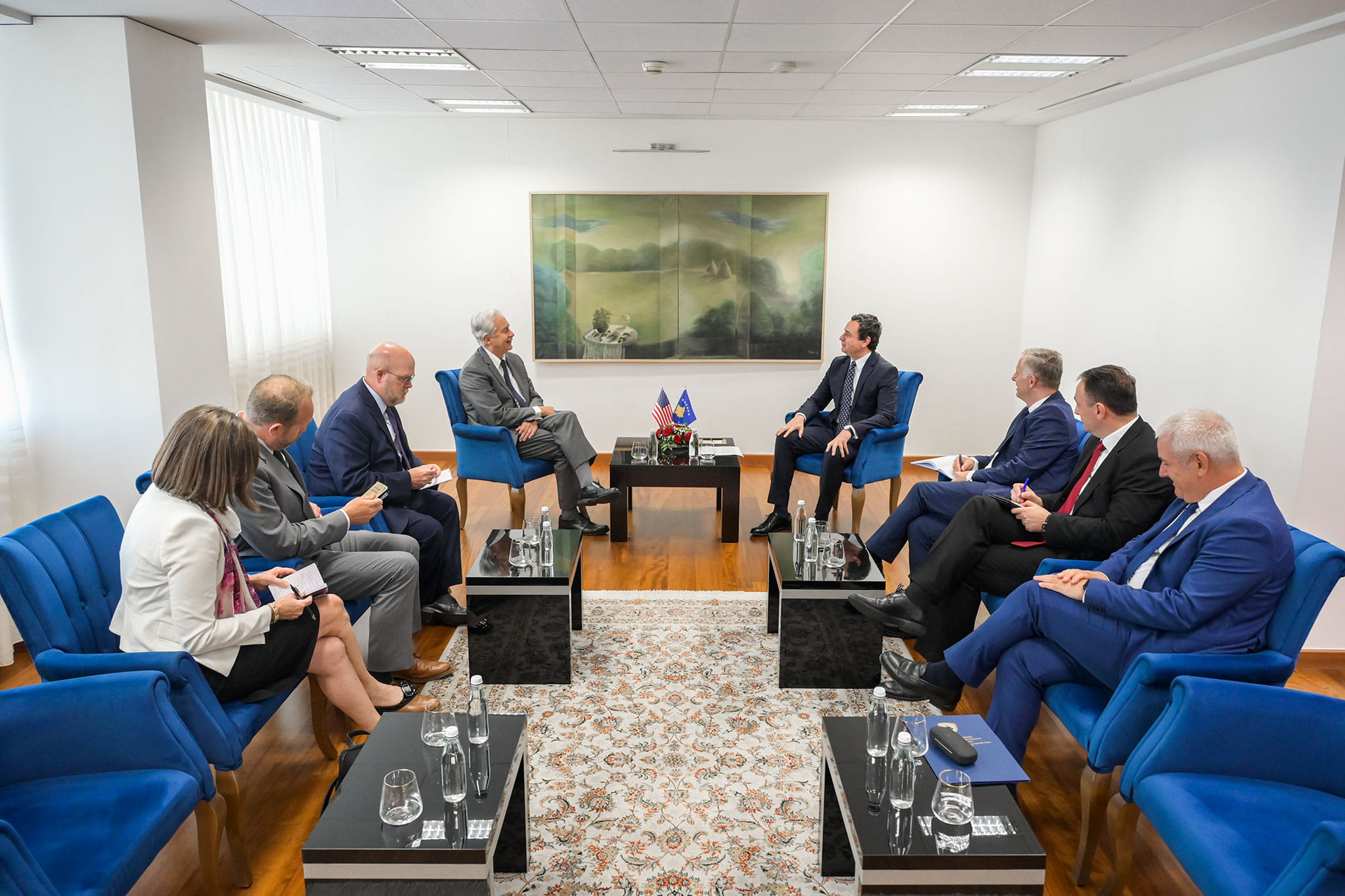The U.S. ambassador’s allegiance to Kremlin-aligned Serbia over Kosovo’s sovereignty is a betrayal of democracy, emboldening aggression, and shattering trust in Western principles.
Dec 2-2024
The deliberate attack on the Ibër-Lepenc canal on November 29, 2024, a critical infrastructure vital for Kosovo’s energy and water supply, marks yet another chapter in Serbia’s systematic campaign to destabilise Kosovo. This assault, alongside a litany of violent incidents in northern Kosovo, is not isolated but a continuation of Belgrade’s longstanding strategy to undermine Kosovo’s sovereignty, an effort now disturbingly endorsed—or at least passively abetted, by Western diplomats, including the U.S. Ambassador to Kosovo, Jeffrey Hovenier.
Marko Đurić, Serbia’s Foreign Minister, exemplifies Belgrade’s mastery of disinformation and political manipulation, strategies honed during the Milosević regime’s genocidal campaigns. Đurić’s statements in response to the attack were a calculated exercise in propaganda warfare, designed to deflect attention from Serbia’s role and cast unwarranted suspicion on Kosovo’s government. His rhetoric mirrors the playbook of Russian disinformation, a connection that becomes increasingly apparent when examining Serbia’s recent foreign policy alignment with the Kremlin. But Đurić is not acting alone; he is part of a broader network of actors, including figures like Berat Buzhala, Baton Haxhiu, and Ramush Haradinaj in Kosovo, who amplify Belgrade’s narrative under the guise of domestic opposition.
The United States’ Role in Enabling Serbia
Ambassador Hovenier’s tenure in Kosovo has been characterised by a troubling alignment with Serbian interests, a stark departure from the United States’ historical support for Kosovo’s sovereignty. Under his watch, the U.S. has not only failed to hold Serbia accountable for its aggression but has actively pressured Kosovo to capitulate to Belgrade’s demands. This pattern of behaviour raises serious questions about Hovenier’s motives and loyalties, particularly in light of Serbia’s formal alignment with Russia’s foreign policy in 2022.
Hovenier’s response to the Ibër-Lepenc attack encapsulates his approach: a refusal to identify Serbia as the perpetrator, despite overwhelming evidence of its involvement, and a call for “calm” that disproportionately burdens Kosovo. This equivocation undermines Kosovo’s legitimate efforts to maintain its sovereignty and emboldens Serbia’s aggressive tactics. It also reflects a broader U.S. policy shift under the Biden administration, which appears more interested in placating Serbia as part of a misguided strategy to detach Belgrade from Moscow than in upholding the principles of democracy and the rule of law in the Balkans.
The U.S. ambassador’s history further complicates his credibility. In September 2023, when Serbia launched a covert military operation in northern Kosovo, modelled after Russia’s annexation of Crimea, Hovenier demanded that Kosovo withdraw its security forces from the region. This intervention, framed as a de-escalation effort, effectively handed Belgrade a propaganda victory and undermined Kosovo’s ability to defend its territorial integrity. By refusing to condemn Serbia’s actions unequivocally, Hovenier has consistently signalled to Belgrade that its aggression will face no meaningful consequences.
Marko Djuric’s Propaganda and Serbia’s Geopolitical Agenda
Djuric’s immediate response to the canal attack was a masterclass in deflection and disinformation. Claiming without evidence that the Kosovo government orchestrated the attack to bolster its domestic standing, Djuric sought to shift blame while framing Serbia as a victim. This narrative not only absolves Serbia of responsibility but also serves its broader goal of delegitimising Kosovo’s institutions.
Djuric’s rhetoric is part of a calculated strategy to draw false equivalencies between Kosovo’s democratic government and Serbia’s authoritarian regime. By painting Pristina as equally culpable in regional instability, Djuric aims to erode international support for Kosovo and create a pretext for further Serbian interference. This approach mirrors Russia’s disinformation tactics in Ukraine, where Moscow has consistently framed Kyiv as the aggressor to justify its own actions.
Djuric is not an isolated actor but part of a broader network that includes Serbian President Aleksandar Vucic, a former propaganda minister under Slobodan Milosevic. Vucic’s regime has perfected the art of manipulating international perceptions while advancing a nationalist agenda that threatens regional stability. Under his leadership, Serbia has deepened its ties with Russia, hosted Wagner Group recruitment centres, and facilitated the transfer of arms to Moscow, all while presenting itself as a candidate for EU membership.
EXPOSE: In this 8-minute episode of The Exposé, I reveal Serbia’s Aleksandar Vucic’s regime and its alignments
The Role of Kosovo’s Domestic Critics
In Kosovo, figures like Berat Buzhala, Baton Haxhiu, and opposition politician Ramush Haradinaj play into Belgrade’s hands by amplifying criticisms of Prime Minister Albin Kurti’s government. While dissent is a cornerstone of democracy, these individuals often blur the line between legitimate opposition and outright complicity in Serbia’s destabilisation efforts. Their attacks on Kurti, frequently echoing Serbian talking points, undermine Kosovo’s unity at a time when external threats demand a coordinated response.
Hovenier’s Complicity and the Erosion of Democratic Principles
Ambassador Hovenier’s actions must be scrutinised not only for their immediate impact on Kosovo but also for their broader implications for U.S. foreign policy. By aligning with Serbia, Hovenier undermines the very principles of democracy and sovereignty that the U.S. claims to champion. His stance on issues like the Mitrovica Bridge, where he has opposed efforts to promote integration and free movement, reflects a troubling willingness to prioritise geopolitical calculations over the rights and aspirations of Kosovo’s citizens.
Hovenier’s engagement with figures like Aleksandar Arsenijevic, a known provocateur with ties to Belgrade, further highlights his compromised position. By legitimising such individuals, Hovenier lends credibility to Serbia’s narrative and weakens Kosovo’s ability to assert its sovereignty. His actions betray the trust of the Kosovar people and risk alienating one of the U.S.’s most reliable allies in the Balkans.
Hovenier’s statements on the November 29 attack, while outwardly condemning the violence, reveal an inconsistency that undermines his credibility and exposes his complicity in enabling Serbia’s agenda in Kosovo. His initial condemnation seemed unequivocal:
“The United States strongly condemns the November 29 attack on critical infrastructure in Kosovo damaging a water canal in Zubin Potok that is essential to Kosovo’s water supply and, operation of Kosovo’s power plants. We are monitoring the situation closely, will support a comprehensive investigation, and have offered our full support to the Government of Kosovo to ensure that those responsible for this criminal attack are identified and held accountable.”
This statement, on the surface, aligns with a commitment to justice and the rule of law. Hovenier’s explicit condemnation of the attack on critical infrastructure acknowledges its importance to Kosovo’s sovereignty and functionality. Yet, the ambassador’s subsequent statements on December 2 highlight a stark departure from this initial position:
“At this point, the United States is not in a position to say who is behind the attack. It is too early for such conclusions, and these matters require careful investigation. What I can say is that Kosovo’s institutions have our support, but I cannot exclude any group, state, or entity at this time.” — KOHA DITORE
This shift from strong condemnation to equivocation, with an intentional refusal to attribute responsibility, raises questions about his motives. By stepping back from his earlier assertion of solidarity with Kosovo, Hovenier appears to adopt a position that indirectly shields Serbia, the likely orchestrator of these attacks. His unwillingness to name Belgrade, despite overwhelming evidence and the broader context of Serbia’s aggression, undermines Kosovo’s security narrative and strengthens Serbia’s propaganda.
The incongruence between Hovenier’s November 29 and December 2 statements highlights a troubling pattern. Initially, he aligns with Kosovo’s government, condemning the attack as criminal and affirming the importance of accountability. However, his later reluctance to identify potential perpetrators shifts the burden of proof onto Kosovo, inadvertently casting doubt on the very institutions he claims to support. This not only weakens Kosovo’s position but emboldens Serbia to continue its aggression under the veil of plausible deniability.
Further exacerbating the issue, Hovenier’s language on December 2 aligns disturbingly with Serbia’s strategy of muddying the waters to evade responsibility. By stating that “no group, state, or entity” could be excluded, Hovenier legitimises Serbia’s narrative, which often portrays Kosovo as the aggressor and fabricator of crises. This false equivalence ignores Serbia’s track record of destabilisation and aggression, undermining Kosovo’s right to defend its sovereignty.
Hovenier’s conduct has reached a point where his presence in Kosovo poses a direct threat to national security. By consistently undermining Kosovo’s sovereignty, legitimising Serbia’s aggression, and fostering mistrust in Kosovo’s institutions, he has failed in his diplomatic duty to uphold democratic principles and stability. His equivocation on the November 29 attack and his history of siding with Serbia in critical moments suggest a deeper alignment with Belgrade’s interests, whether intentional or not.
Kosovo cannot afford to tolerate a diplomat whose actions compromise its sovereignty and embolden its aggressors. President Vjosa Osmani and Prime Minister Albin Kurti must take decisive action by requesting Hovenier’s immediate removal. His continued presence not only undermines Kosovo’s security but also sends a dangerous signal to Serbia and other destabilising actors in the region that aggression will be met with appeasement.
Leave a comment
The Broader Implications for U.S. Policy
Hovenier’s approach also reflects poorly on U.S. foreign policy. By failing to hold Serbia accountable and instead pressuring Kosovo, the United States risks alienating one of its most steadfast allies in the Balkans. This erosion of trust has broader implications for U.S. influence in the region and its ability to counter authoritarianism and Russian interference.
Renowned experts on democratic resilience have repeatedly warned about the dangers of enabling aggressors through equivocation. Anne Applebaum, an authority on authoritarianism, notes that:
“Authoritarians thrive on the indecision and appeasement of democracies. Their strength lies not only in their aggression but in the willingness of others to rationalise it.”
Hovenier’s actions epitomise this dynamic, as his reluctance to confront Serbia emboldens its aggression and undermines Kosovo’s democratic institutions.
Hovenier’s inconsistent statements and troubling history of siding with Serbia demonstrate that he is unfit to serve as the U.S. ambassador to Kosovo. His actions not only compromise Kosovo’s sovereignty but also jeopardize regional stability and the credibility of U.S. foreign policy. It is imperative that Kosovo’s leadership demand his immediate removal and that the United States reassess its approach to the Balkans. Diplomacy must be rooted in the principles of democracy and justice, not in appeasement of aggressors.
The international community must hold Serbia accountable for its actions, including its role in the canal attack and its broader campaign to destabilise Kosovo. The EU and the U.S. must abandon their policy of appeasement and adopt a firm stance that prioritises the rule of law and regional stability over short-term geopolitical interests.


Shënim:
Redaksia, diplomacia. dk nuk e merr përgjegjësinë për pikëpamjet e autorit në shkrimin e botuar!
Respekt!
